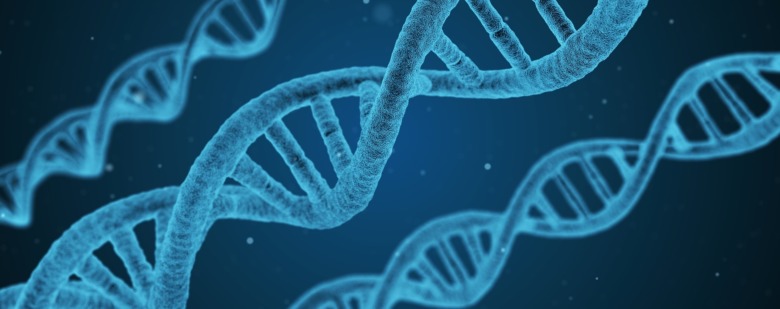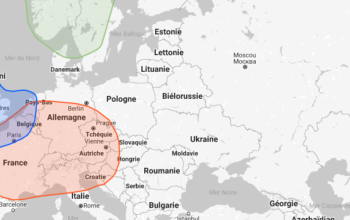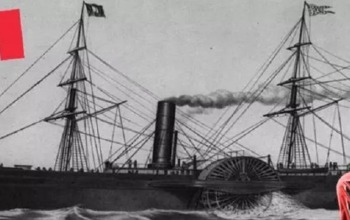DNA testing in France
If you have French heritage, you might wonder why you don’t have many French DNA matches. Here is an overview of DNA testing in France to help you better understand where you might find your French cousins.
Is DNA testing legal in France?
According to the French bioethics law, DNA testing is only allowed for medical, scientific or judicial purposes. The main concern is that paternity tests and medical DNA tests shouldn’t be done without supervision. But the ban also extends to genealogical DNA tests.
When this law was debated earlier this year, genealogists thought that this would change. And that DNA testing for genealogy would be possible, at last. But the National Assembly and the Senate finally decided against it.
In consequence, France remains the last country in Europe where DNA testing is still illegal.
This mostly means that no French company is allowed to sell DNA tests for recreational purposes like genealogy. And that French people shouldn’t have their DNA tested outside of a medical facility.
However, no one has ever been fined for buying a direct-to-consumer DNA test. And more and more French people have had their DNA tested anyway, by buying kits to DNA testing companies abroad.
Where can you buy DNA tests from France?
As a consequence DNA tests are not as easy to buy from France as from other countries. Some of the major international companies (like Ancestry) do not ship their tests to France. And most of the companies don’t make advertisements in France.
23andme and FamilyTreeDNA have been selling DNA tests in France the longest. But none of their websites are available in French, which is an obstacle for some French people.
MyHeritage started selling in France in 2018, and they have done a lot of advertisement for their tests, on TV and through Youtube videos. They are also the only ones who provide information in French. So this is where most French people buy their DNA tests nowadays.
However data protection is a big concern for many French people: they would rather not “give away” their DNA outside of the European Union. So a lot of French genealogists are waiting for a legalization before buying DNA tests.
Where can you find French DNA matches?
As Ancestry doesn’t ship to France, you might not have a lot of French DNA matches there. You might find a few French DNA matches on FamilyTreeDNA and 23andme.
But nowadays, it’s on MyHeritage that you will have the most chances of finding French cousins. Moreover MyHeritage allows you to filter your matches by country. Which is convenient if you want to focus on your French heritage.
Recently, a very popular French genealogy website – Geneanet – launched their DNA matching service. They do not sell DNA tests, but you can upload your results from any other major company (Ancestry, FamilyTreeDNA, MyHeritage, LivingDNA, 23andme) to find DNA matches.
Their main asset is that they have a large database of family trees for France (and neighboring countries such as Belgium, Luxembourg, …). So most of your matches will have a documented family tree, which will help you find the connection.
For now, it is still in beta test, so there are no analysis tools (no chromosome browser, etc.). It will only tell you “you share x% with this person”. And there are not a lot of people yet. But I’m sure this will change in the upcoming months and that it will grow bigger.



I have already entered my DNA on Geneanet. I have matched with two people and we have been in contact with each other and found matching French ancestors. Lee
I just uploaded my info to Geneanet and came up with a few matches. Unfortunately, it’s basically useless because people don’t have family trees, and in many cases, they don’t even use their names. If you want to find matches on any site, add a tree and your name. Women should use their maiden name.
It’s not useless. Depending on how high your cm’s can help help closer finding how you both are related. When I started I didn’t know much of anything on my paternal grandparents side and now I’ve learned so much. Good luck
I haven’t took the test but it not useless it help you know what you are and who you are related to.
In honor of my late father who served in Europe in WWII, I assist at no charge families researching their WWII family history.
I am assisting a 75-year-old man in France who is searching for relatives of his American GI father.
To access the DNA of Americans, I sent him an Ancestry DNA kit.
He is unable to access the DNA section of his Ancestry account from his computer in France. But using his username and password, I can access the DNA section of his Ancestry account from my PC in the U.S.
Ancestry has just received his DNA kit so we have not results yet.
While ideally, I would like him to have direct access to his results for now we have agreed that I will forward the results to him. If we find a close relative of his father’s, I will assist him in contact them.
I have been following the instructions of GI Trace, a group in the United Kingdom that helps children and grandchildren find their American GI fathers and grandfathers from WWII through the Cold War.
Is my assessment accurate that Ancestry DNA results may be blocked in France?
Any other ideas or suggestions.
Thank you.
Hello,
I haven’t tested with Ancestry so I am not sure, but I think that the DNA pages are indeed blocked in France.
However, I believe it should be possible for him to access it through a Virtual Private Network.
Best regards,
Elise
Bonjour Elise
I have been a member of Ancestry.co.uk for some years now, although living in France for over 20 years. Until recently I saw that I could still order a DNA testing kit via their website but it wouldn’t be posted to France. However it seems they have become much more strict now, and I am unable to access any of the DNA pages (I wanted to order a kit to send to a UK address but cannot even access the DNA page). If Geneanet has been taken over by Ancestry, will they also stop supplying DNA kits and results to people living in France?
Hello,
AncestryDNA is indeed very hard to access from France, to prevent French people from buying kits. I think the only way to access AncestryDNA from France is to use a VPN.
Geneanet doesn’t sell DNA kits, they only provide a platform to upload DNA results from other companies. This apparently abides by the law, so they should be able to continue.
No need for VPN, just access it from a different ‘country’ website of Ancestry. I can fully access my DNA tests through Ancestry.co.uk without any VPN or proxy.
No need for VPN, you can access the DNA match pages just by logging in on ancestry’s UK or US website.
Hello Mr. Cizewski,
I am trying to solve a mystery for my 75 year old mother… From her DNA results we had done a year ago, we determined that her father wasn’t her bio father… We strongly believe she was fathered by a man from the French Military (Air Force) when my grandmother was stationed in Keelser AFB in Biloxi Mississippi in 1944. The French sent men to Keesler to be trained by the USAF and my grandmother worked at the base commissary while she was there. I’ve uploaded my mom’s DNA data to this site in hopes that there are French people doing the same… Thoughts and/or suggestions?
Thanks,
Lance M. Zeigler
Maryland, USA
I uploaded my raw DNA to Geneanet about a year ago. I have about 90 matches with people in France. Also, found several members who share my ancestors in their family trees. Great site for researching your French heritage. 0
Thank you for sharing your insights. I was wondering why I did not have a lot of French Ancestry matches and did not know, until today, that ‘recreational’ DNA testing was illegal in France.
My French ancestry lies in the Haute-Savoie region, however I am sure there is a larger area that would be covered. It is helpful to be a member of the GeneaNet site, particularly for their newspaper documentation and announcements.
Is Geneanet a safe place to post DNA results? I’ve heard horror-stories about some sites mishandling DNA data.
Hello,
Geneanet seems like a safe place to me. They have existed as a genealogy website for more than 20 years.
As a side note, they have just been acquired by Ancestry, so if you trust Ancestry with your data, I believe you can also trust them.
Best regards,
Elise
Bonjour,
I received my DNA results from Ancestry indicating 33% French which I know to be on my maternal side. I uploaded my DNA results to Geneanet (Ancestry gave me zero DNA matches or info on the French side.) I was able to access some of the French archives to start building a family tree. My French grand-mother was very good on building a tree by hand decades ago. However, I am not getting any French DNA matches but only on my paternal side. Would getting a DNA test from 23Me help? Also on my maternal side, I come from a small family. Myself, my mother, my grandfather were only child. My grandmother had siblings who had no children. Beyond that (as far as 5-6 generations), many in the family tree had no children. This results in very few cousins. I am just wondering if I will be disappointed in researching my roots. I would appreciate your thoughts or advice. Merci
Hello,
I am not sure that a test from 23andme would help for your French connections. You should have more French DNA matches if you get a test from MyHeritage: it’s the most popular DNA test in France at the moment, and this is where I get the most French DNA matches.
However, if a lot of people from your tree didn’t have children, you might not find a lot of close matches. You will have to go up as far as possible in your tree, and look for smaller DNA matches.
Best regards,
Elise
One key fact in the French decision to block genetic DNA testing which has not been commented on is the fact that, year-on-year, the French are permanently losing more and more of their genetic history. Over this last year, many of the people whose DNA would otherwise have been recorded – and become part of the national DNA corpus for future use in scientific, medical and historical research – have now passed away. Since the US, British and other nations have been recording their DNA for over 20 years now, an entire generation of France’s genetic history has already been lost. While some of that DNA will survive in 50% diluted form in their children, the DNA of all those older people who had no living children has already been permanently lost. France’s genetic history is being systematically and irretrievably wiped out by a government dictat which blocks the rights of French people to discover their past.
Wow, just did MyHeritage (a gift from a friend), and NO French showed up, even though we’ve been to my father’s home village (Franche Compte) and met older family who know my dad’s grandfather, etc. If family was small and moved to U.S., … but still, I’m stunned. Close to border with Germany (no DNA shown), Switzerland (not sure how that would look), and Italy (a small per cent of my DNA). Granted the per cent I expected was about 25% based on other family roots, but none? I was shocked.
Hello, it seems surprising indeed, but these estimates are really not precise enough (yet). I’ve even seen French people with 100% French ancestors but no French DNA showing up in the estimates…!
hi i would like to get the dna test like tom conti
they had found out that he was related to naploen banapart
how would it take this test also how did they find the dna form napoleon.
also my relative is related to perhaps french weavers and the hugenots how do i go back
further to find this out. mary vernell had married thomas hobbs in 1651 berkshire
thanks tish
hi i would like to find out more about my dna
in england. how would you take a dna test and find that you are related to napolen
bonepart also ozzy ozbounre took a blood test dna and found out that he was related to
jesse james the russian royal family the tzars and george the 1st. how would you find this out
with out getting the dna from some one who has passed a way.
i would be intrested in takiing a blood dna test could anyone help me with this
thanks tish
Hello, if you want to find French relatives, you can take a DNA test at MyHeritage, but I do not think that any of the mainstream DNA companies can tell you if you are related to Napoleon (I have never heard of a company having a sample of his DNA).
hi elise
a company from america came over took the blood dna test
form ozzy osbourne and found the results in america and this was put on the
internet. another company which has now closed took tom contis dna and found out
that he was related to naploen bonabarte
thanks tish
hi elsie this is what i found
Ancestor: French military leader Napoleon, left, and the Scottish actor Tom Conti
The discovery was made by ScotlandsDNA which is analysing the roots of people from Scotland. They have taken samples of saliva from over 1,000 people to discover more about their ancestry.
The Scots have paid £170 to take part and has thrown up some interesting results.
However, the most remarkable is the claim that Tom Conti is related to the French military leader.
Both have the DNA marker M34 – proving that there is a family link.
Mr Conti told the Observer he was shocked to learn he was related to the French emperor who died in 1821.
The M34 DNA marker that Conti and Napoleon both have is also shared by the military leader’s great great grandnephew Prince Charles Napoleon Bonaparte, who is a French politician.
Last year Napoleon’s DNA was traced from three surviving beard hairs – and it matched those belonging to the politician exactly.
The researchers also found the microscopic remnants of some shaving soap and some iron which is likely to be from his beard.
There are thought to be very few direct descendants of Napoleon in Britain.
The ScotlandsDNA programme, led by Edinburgh University geneticist Dr Jim Wilson and historian Alistair Moffatt, is set to be expanded to cover Britain
thnaks tish
hi these are where i found the informationon line
We’ve all suspected, now it’s official: Ozzy Osbourne IS a …
Daily Mail
https://www.dailymail.co.uk › article-1323455 › Wev…
25 Oct 2010 — Researchers studying his DNA have found that the singer is the descendant of a Neanderthal man.
Ozzy Osbourne’s ‘genetic mutation’ enabled him to survive …
https://www.dailymail.co.uk › news › article-7345481
10 Aug 2019 — Scientists who examined Ozzy Osbourne’s DNA found that the Black Sabbath rocker has a genetic mutation that is believed to be responsible .
Ozzy Osbourne gave his DNA to a Massachusetts-based genome company
Sequencing of his genome revealed a rare genetic variation
Experts believe mutation allowed Osbourne to survive years of hard partying
New book by biologists Bill Sullivan says genes may determine human addiction
ozzy found out that he was related to the tzar of russia jessie james and gerorge the 1st
if anyone would like to have a look online
at ozzys osborne dna and tom contis dna let me know thnaks tish
i have actually taken a dna test. iam 33% scandinavian 10% french 4% ittlay
5% greek 7% spain. i took this test but it does not tell me who iam related to
could some one help me with this thank tish
Hello, I’m French and I don’t know my father at all and I just read your post and I’m wondering which test I should do now in 2023 since your post was from 2020 I think. I was so sad to read that it’s not popular in France as such but I think it could possibly help me still. I hope 🙏🙏🙏 😓
Hello, for more information on DNA tests in France, you can download my guide on my French website.
For your info about Geneanet: December 20, 2023: The Geneanet DNA section, the features and the associated data (DNA cousins list, raw data from your DNA provider) will be permanently deleted. https://en.geneanet.org/genealogyblog/post/2023/11/geneanet-dna-features-will-be-discontinued
Thank you for your update. The DNA section of Geneanet is indeed now closed.
Hi i am from Canada and i am looking for my father and i dont know who’s he but I know he’s in French country so please i need to DNA
Hello. I have an English friend, now resident in France, who was adopted at birth.
She would like to make a DNA test to trace her biologicxal parents.
Would I be arrested by customs if I take a testing kit with me when I visit her later this year?
Hello. No, don’t worry! I don’t think there is any risk.